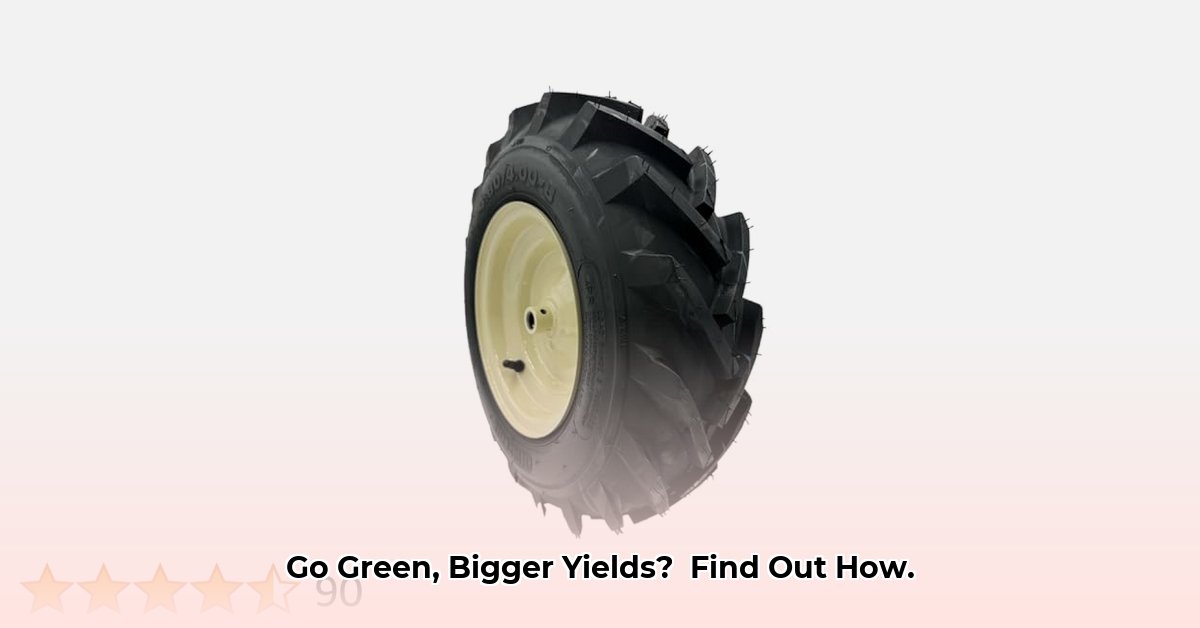
4.80/4.00 x 8 Tractor Supply Tires: A Greener Approach to Farming
The humble tractor tire—often overlooked—plays a surprisingly significant role in the sustainability of modern farming. Choosing the right 4.80/4.00 x 8 tires for your tractor isn't simply about cost; it's a strategic decision impacting your farm's efficiency, environmental footprint, and long-term profitability. This article explores the benefits of sustainable tire practices, highlighting the specific advantages of 4.80/4.00 x 8 tires and providing a practical guide for farmers looking to adopt a greener approach. For more tire options, check out Firestone Tractor Tires.
The Environmental Impact of Farm Tires: More Than Meets the Eye
Consider the lifecycle of a tractor tire. Built to withstand immense pressure and designed for longevity, these crucial components eventually reach the end of their operational life. Many end up in landfills, contributing to a growing environmental problem. However, a growing awareness of this issue is driving innovation and change within the agricultural tire industry, paving the way for more sustainable solutions. But isn't it surprising how something seemingly minor can have such a large overall impact?
Sustainable Tire Choices: Beyond the Sticker Price
Selecting 4.80/4.00 x 8 tires necessitates a holistic approach that extends beyond initial cost considerations. Factors such as material sourcing (are they ethically and sustainably produced?), manufacturing processes, and end-of-life disposal methods should all factor into your decision. "We're not just talking about rubber; we're considering the entire manufacturing process and its impact on the environment," says Dr. Emily Carter, Professor of Chemical and Biomolecular Engineering at Princeton University. This broader perspective shifts the focus from a purely transactional purchase to a long-term investment in both farm productivity and environmental stewardship.
Making the Switch: A Practical Guide to Sustainable Tire Adoption
Transitioning to sustainable tire practices requires a phased approach. This step-by-step guide offers a practical roadmap for farmers looking to incorporate greener practices into their operations:
Conduct Thorough Research: Begin by investigating available 4.80/4.00 x 8 tire options, carefully examining manufacturers' claims regarding sustainability initiatives and verifying their authenticity through independent research.
Implement Small-Scale Testing: Start with a controlled trial on a smaller tractor or in a less demanding field to evaluate the performance and suitability of sustainable tires under your specific conditions.
Monitor Key Performance Indicators: Closely track tire wear, fuel efficiency, and overall performance, comparing these metrics with results from using conventional tires to quantify the benefits of sustainable options.
Conduct a Comprehensive Evaluation: After several months of usage, assess whether the long-term environmental and financial advantages outweigh any initial investment costs or minor performance differences observed during the trial.
The Future of Sustainable Agriculture Tires: Innovation and Collaboration
Ongoing research and development efforts are leading to significant advances in sustainable tire technology. Manufacturers are incorporating recycled materials and exploring bio-based alternatives, while government regulations are further incentivizing the adoption of eco-friendly practices. This wave of innovation promises a future where high-performing, environmentally conscious 4.80/4.00 x 8 tires become the industry standard. Isn't this a fantastic collaborative effort?
Weighing the Pros and Cons: A Comparative Analysis
| Feature | Pros | Cons |
|---|---|---|
| Environmental Impact | Reduced landfill waste; lower carbon footprint during manufacturing and use. | Higher initial cost; potentially limited availability in certain regions. |
| Performance | Potentially longer lifespan; potentially improved traction and fuel efficiency. | Performance may vary depending on technology and conditions. |
| Cost | Lower long-term costs due to extended lifespan; potential government incentives. | Higher initial purchase price. |
Choosing Sustainable Tires: A Step-by-Step Guide
Key Takeaways:
- Tire selection significantly impacts both farm efficiency and environmental sustainability.
- Radial tires offer superior traction and fuel efficiency compared to bias-ply options.
- IF and VF tire technologies minimize soil compaction, improving long-term soil health.
- Terrain, climate, and farming practices are crucial for optimal tire choice.
- Proper tire management extends lifespan and reduces waste.
This transition to sustainable farming requires a collective effort, involving farmers, manufacturers, and policymakers. Investing in environmentally friendly tires is not merely a farm-level decision; it's a contribution to a healthier planet and a more sustainable future for all.